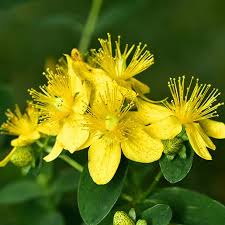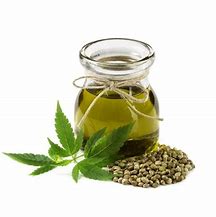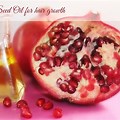St john's Wort Oil (macerated) - 2







St john's Wort Oil (macerated) - 2
Folk-lore and traditional plant uses
at one time this plant was popularly regarded as being able to ward off witchcraft, and in the Middle Ages it was hung in doorways and windows to keep evil spirits and devils at bay. Knights would put it on sword wounds to help the healing process and there is modern evidence of the plant's bactericidal power. Fresh flowers in tea, tincture or olive oil is reportedly a popular domestic medicine for external ulcers, wounds (especially with severed nerve tissue), sores, cuts and bruises (Leung & Foster 1996). Samuel Gray (1818) recommends a tincture of the flower in 'maniacal and melancholic' illness. The plant is diuretic, expectorant and calming to the nervous system; infusions are used for rheumatism. Hobbs (1990) states that modern applications of hypericum (except antiviral) date back 2000 years.
Therapeutic Properties - Internal use
Hypericum has been used for anxiety, depression, gastric conditions (Krylov & Ibatov 1993) and unrest. Hypericum extracts are licensed in Germany and sold in profusion for the treatment of depression, anxiety and sleep disorders. A recent review concluded that more patients with depression responded to hypericum extracts than responded to either placebo or anti-depression medications (Linde et al 1996).
Hypericin, the red pigment present in hypericum, is being studied as an antiviral agent which may have use in the management of AIDs ( Abrahams 1990, Anon 1991). Hypericin has no antidepressant property, but in vitro tests have shown that hypericin affects infected cells and prevents replication of the retrovirus (HIV) (Chevallier 1999). In Germany the oil is allowed internally for dyspeptic complaints and externally for treatment of injuries, myalgia and first degree burns (Monograph 1989).
- Therapeutic properties - external use
Beneficial on wounds where is nerve tissue damage.
Inflamed nerve conditions, including sunburn: the oil will lower the skin temperature.
It is said that hypercinum oil can be massage on to the lower back in cases of bed wetting.
has been suggested for haemorrhoids, gout, rheumatism, sores, ulcers and wounds, urticaria, herpes (Blumenthal et al 1997, Bruneton 1995, Shaparenko 1979, Bartman 1996).
A 50/50 mix with calendula oil is effective in contusion and bruises.
Aqueous extracts of hypericum inhibit the growth of Myobacterium tuberculosis. Success has been reported (Newall et al 1996) in treating vitiligo by oral and topical administration of hypericum extracts. Blossom, leaf, capsule and stalk are all said to be antibiotic.
In France drugs based on the flowering tops of St. John's wort may claim indication only for local treatment, as an emollient, itch-relieving, trophic protective (for chaps, bruises, frostbite or insect bites), for sunburn and other superficial burns, for pain linked to disorders of the oral cavity and the oropharynx (Bruneton 1995)
Cosmetic Use
The oil is excellent for use on the skin, as it is soothing, antiseptic and analgesic. It has been recommended as a cosmetic skin tightener.
Culinary use
The leaves were once used in salads, but this is not to be recommended.
Cautionary notes
Their are no known contraindications to the judicious use of the macerated oil. However, excessive use may cause skin allergy in some sensitive individuals, which is made worse by exposure to the sun. Delayed Hypersensitivity or photo dermatitis has been noted following ingestion of a herbal tea made from leaves (Benner & Lee 1979). The volatile oil of St. John's wort is irritant (Capelletti et al 1982). Treatment with hypericum gel followed by exposure to sunlight has resulted in second degree burns (Upton 1997).
The photosensitizing properties of St. John's Wort in grazing animals if often misunderstood; it is a question of dosage. Animals which ingest too much of the herb in sunny weather may suffer swollen lips, so that they are unable to eat, but this is reversible if the animals are kept in dark barns for a few days. Similarly fair skinned people may experience sunburn like reactions with high levels of hypericin ingestion.
Reference: Carrier Oils For Aromatherapy & Massage: Len Price with Ian Smith & Shirley Price
Articles-Most Read
- Home
- Contact Us
- Coconut Oil-2
- Absorption Ratings for Carrier Oils
- Cold Pressing Method
- What are Essential Fatty Acids
- Cherry Kernel Oil
- Fixed Oils and Skin Penetration
- Hempseed Oil
- Almond Oil
- Cocoa butter
- Camelina Oil
- Antibacterial Effects Of Carrier Oil
- Coconut Oil
- Lime Blossom Oil (macerated)
- Carrot Oil, Wild Carrot Oil (macerated)
- Apricot Kernel Oil
- Kukui Nut Oil
- Jojoba Wax
- Pumkin Seed Oil - Cucurbita maxima, C. pepo
- Passion Flower OIl (Macerated)
- Hydrocotyle Oil (macerated)
- Palm Kernel Oil
- Rapeseed Oil - Carrier Oil
- Nutrients
Who's On Line
We have 23 guests and no members online
Articles-Latest
- How to Make Homemade Olive Oil: A Step-by-Step Guide
- 20 Evidence-Based Aloe Vera Oil Benefits For Skin, Hair & Health
- Peanut oil - Cold pressed - Are There Health Benefits? How To Make
- What Are the Health Benefits of Black Seed Oil?
- Comfrey oil Infused
- Chamomile Flowers Infused Oil
- Calendula Flowers Infused Oil
- Arnica Flowers Infused Oil
- How To Make Herb-Infused Oils
- DIY avocado oil for healthy skin
- How To Make Coconut Oil
- 8 Benefits of Mustard Oil, Plus How to Use It
- SHOREA STENOPTERA SEED BUTTER
- Shea Butter- 7 Amazing Benefits Of Shea Butter
- Monoi Oil For Hair & Skin
- Mango Seed Oil
- Cohune Oil Is The Next Big Thing
- Brazil Nut OIl
- 7 Impressive Benefits Of Allspice
- Camelina Oil Benefits, Uses, and Side Effects




